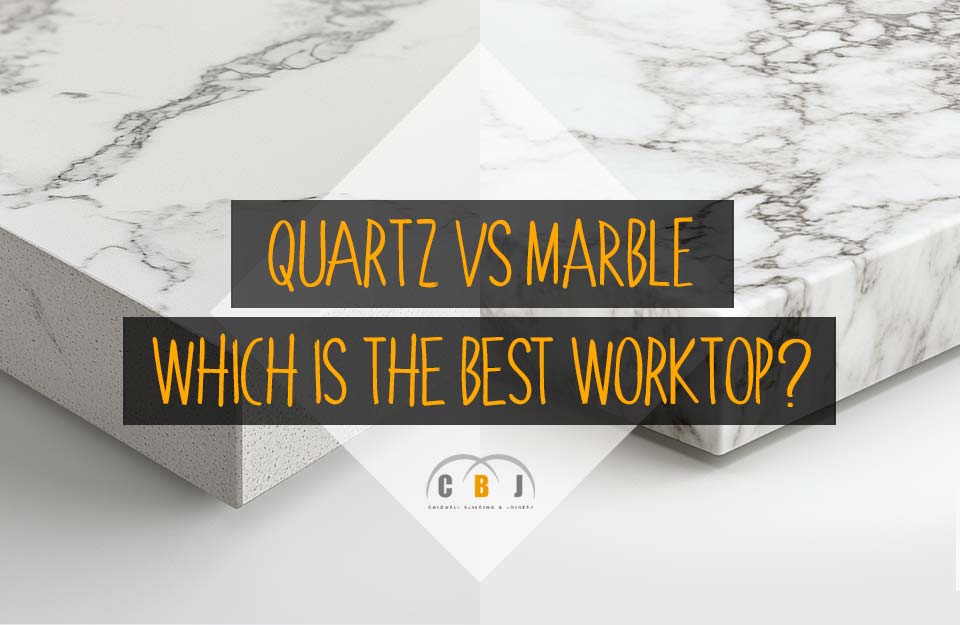News
Quartz vs Marble - Which is the Best Worktop?
Author Chigwell Building & Joinery
Date 01/10/2024
Both marble and quartz are very popular for countertops and worktops.
They are aesthetically pleasing and functional materials, and often people are unsure whether to choose one or the other as they have a number of similarities.
In this article we shall be discussing some key differences between quartz and marble to help you distinguish them from each other and make a well informed choice depending on your needs and preferences.
Table of Contents
- Key Differences Between Quartz & Marble
- Origin
- Appearance
- Imperfections
- Durability
- Stain Resistance
- Mark & Scratch Resistance
- Maintenance & Care
- Heat Resistance
- Longevity
- Water Resistance
- Design
- Installation
- Cost
- Conclusion
Key Differences Between Quartz & Marble
Marble is a timeless classic.
This natural stone has been used as a building material for centuries.
From statues to countertops, there is no denying that marble is beautiful, stylish and elegant.
The fact that it comes in numerous different colours and patterns, which all occur naturally is a distinctive aspect of this material.
Marble is also considerably durable.
Quartz on the other hand is engineered, due to the fact that it comprises natural quartz added to polyresin.
It is still very strong and durable, and comes in countless colours and patterns.
You will even find quartz that mimics the look of marble and granite for instance.
When it comes to styles and patterns, quartz offers more options than marble, however one will need to keep in mind that it is not completely natural.
Other key differences between marble and quartz include their porosity and their maintenance.
Let us delve a bit deeper into the various differences hereunder.
Origin
Marble is a natural stone that is created when limestone is subjected to heat and pressure in a process called metamorphism.
Marble mines and quarries are located in areas where marble occurs naturally.
This includes the USA, Greece, Turkey and Southern Italy.
Quartz, on the other hand, is a manufactured material since it comprises around 90% natural quartz combined with around 10% of polymer resin.
It has not been in use as much as marble, since it was not until the 1960s that this manufacturing process was used to create a slab.
An Italian inventor, Marcello Toncelli, came up with this idea and established Breton, and since then quartz has become highly popular for worktops.
Appearance
Both quartz and marble are very beautiful, and they will add value to any home.
Both of them have their unique colour variations, but needless to say since quartz is not completely natural, it offers more specific variations when it comes to appearance.
Marble is a natural stone, and so you cannot change the way it looks.
Quartz has around 10% polymer resin and as a result it has a unique pigmentation.
Therefore the colours and patterns it is manufactured with can be altered and made according to specific preferences.
On the other hand, with marble you can expect to have natural grains, flecks and veins, which make it look far less uniform in appearance than quartz.
Imperfections
Marble is available in a wide range of colours.
However, since it is a natural stone, there may be imperfections which result in variations in the patterns and colours of the slabs.
While this is something that some people do not really care about because they consider it as a key part of marble’s natural beauty, it might be undesirable for others who prefer a more consistent look.
Durability
Both quartz and marble are durable and strong materials.
However, if you were to compare them to one another, quartz ranks as more durable than marble.
This is because marble is more prone to chipping or cracking upon impact.
Marble is more suitable for low traffic areas such as window sills and bathrooms, rather than for kitchen countertops.
Quartz effectively ranks among the hardest minerals.
If you want a truly durable material that is highly resistant to chipping, staining or scratching, then there is no doubt that quartz is far better than marble.
It does not require any sealing or treatments either.
Stain Resistance
As touched upon previously, quartz is far better when it comes to stain resistance than marble.
Marble will easily get stained if juice, oil, coffee or wine is spilled for instance, and hence it is not such a good choice as a kitchen countertop.
Should marble be used for a kitchen countertop, it is a must to protect it with a high-grade sealant to protect it from spills involving acids or chemicals.
Quartz on the other hand is a non-porous material, and consequently it can resist staining very well.
Mark & Scratch Resistance
Just as with stains, marble does not fare as well as quartz.
Due to its soft-core, marble is more prone to scratching, especially if it is rubbed with an acidic medium.
Quartz is much more resistant to marks and scratches.
That is why quartz should be your choice if it is going to be installed in a kitchen or in a high traffic area.
Maintenance & Care
Quartz is undeniably a better choice if you do not want to worry about care and maintenance.
This is due to the fact that there is no need to seal quartz and it is super easy to clean.
Simply wipe with a soft cloth dabbed in mild soapy water, and that’s it!
No need for specialised cleaners or complicated regular maintenance.
Conversely, marble countertops would require sealing in order to prevent staining.
Re-sealing on a regular basis is also highly recommended.
It is also important to invest in specialised marble cleaning products to maintain marble in good condition over time.
Heat Resistance
Quartz is durable, but you need to be careful when it comes to high heat.
Excessive heat could end up scorching the surface of a quartz countertop as it would melt the resin within.
Permanent burn marks could result on the surface, and so you would need to exercise caution and not place hot pots or pans directly onto a quartz worktop.
Longevity
There is no denying that both marble and quartz do well in terms of their longevity as long as they are well taken care of.
They are both strong and durable.
However, in the case of quartz caution needs to be exercised to avoid exposing it to excessive heat as it is not that heat resistant.
On the other hand, in the case of marble it is important to re-seal it to avoid staining, and make sure that it is not scratched.
With quartz you will typically also get a warranty, often ranging from 10 to 20 years.
Some brands even offer a lifetime warranty.
Water Resistance
Since marble is quite porous it will need to be sealed, and re-sealed on a regular basis.
Otherwise it will not fare well in terms of water resistance over the longer term.
On the other hand, quartz is a non-porous material.
Hence its water resistance is one of its biggest advantages.
There is thus no need to seal quartz countertops.
This is also advantageous since it will not harbour any bacteria and there is no need to worry about stains either.
Design
Quartz and marble are undeniably beautiful options.
They are stylish and elegant, and will add value wherever they are installed.
One of the most striking aspects of marble is that as it is a natural material the designs are unique and unmatched.
This may be appealing to some, while for others it could feel as a problem.
In the case of the latter type of customers, quartz may be a better option because the consistency in quartz slabs’ colours and patterns can make things easier.
Over the years, many advancements were made in the manufacturing of quartz in order to come up with original designs that can cater for customers’ diverse preferences.
As a result, new designs are introduced regularly.
Installation
The installation process of quartz or marble is a job that will need to be left in the hands of professionals.
Since the slabs are very heavy it is not a simple task to install them.
Moreover, cutting will need to be carried out precisely, and thus specialised tools will be required.
It is of utmost importance to ensure that the installation is carried out carefully as any incorrect measurements, cuts or fixings will lead to a waste of money as both marble and quartz are rather costly.
Cost
Considering the style and value offered by marble and quartz, it goes without saying that the cost involved is quite high.
Engineered stone such as quartz does not come cheap.
To give you an idea, you can expect to pay between £50 to £100 pounds per square foot, depending on material and finish.
Marble is also costly but it is often slightly cheaper than quartz.
In fact you can look at a price tag between £30 to £75 pounds per square foot.
Having said that you would need to factor in the ongoing costs.
As noted earlier, marble requires much more maintenance than quartz.
It needs to be re-sealed and re-polished on a regular basis.
This is ideally done by professionals and so the costs are not that low, and if the area is large, it will be even higher.
Therefore you may wish to take into account these costs as well, rather than only the costs of purchasing and installing.
Conclusion
There are various considerations that one would need to take into account when deciding whether to invest in a quartz or a marble countertop.
Both of them have several advantages, and there is no denying that they are both great options which will add value and beauty to your home.
The differences we highlighted above will allow you to have a clearer idea about what to look out for in terms of resistance, maintenance needs and appearance considerations.
Ultimately they are all great materials which are unique and beautiful in their own way.


